

|
 |
Man at the Top: The Complete First Series (TV)
R2 - United Kingdom - Network Review written by and copyright: Paul Lewis (25th January 2010). |
|
The Show
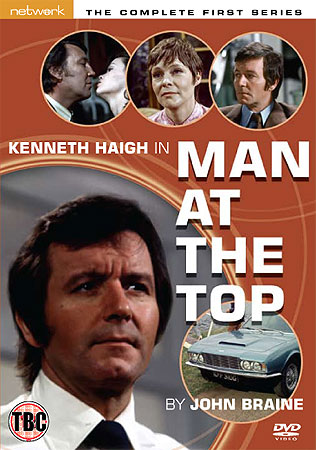 Man at the Top: The Complete First Series 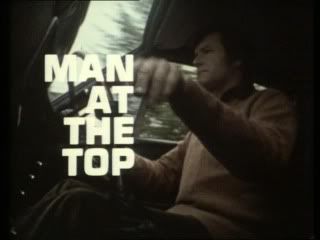 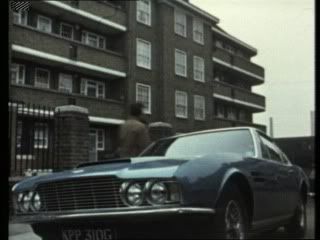
Produced in 1970 for Thames Television, Man at the Top is a continuation of John Braine’s pair of novels featuring the character of Joe Lampton. Braine’s first novel about Lampton, Room at the Top, was filmed in 1958 and featured Laurence Harvey as Lampton. Directed by Jack Clayton, Room at the Top was one of the first wave of films in what would become known as the British New Wave, whose movement towards social realism and focus on the lives of the working classes had been instigated by the success of plays such as John Osborne’s Look Back in Anger (in 1956). Set in Yorkshire, Room at the Top is often cited as the first film to feature regional accents and dialect that were not sourced from the South of England: prior to Room at the Top, working class characters in films had largely unrealistically spoken in middle-class received pronunciation, although some elements of working class speech from the south of England had cropped up in various films (see Walker, 1974: 45-6). Braine himself asserted that the ‘new dimension of the film was in presenting a boy from the working classes not as a downtrodden victim, but as he really was [….] [W]hat was important was that Joe was honest about the whole business of class’ (Braine, quoted in Richards, 1997: 149). In Room at the Top, the character of Lampton is introduced as he relocates from the Yorkshire factory town of Dufton to Warnley, to take up a new clerical job. Lampton begins a halting relationship with Susan Brown (Heather Sears), a young woman who also happens to be the daughter of a local industrialist. However, Lampton finds himself to be the object of class-based prejudice by Susan’s family. Lampton begins an illicit affair with an older woman, Alice Aisgill (Simone Signoret), but Alice’s husband discovers the truth of her liaisons with Lampton and threatens her with divorce, and Lampton finds that he must also deal with Susan’s revelation that she is pregnant with his child. Room at the Top had been written in 1957 but set in the late-1940s, in the years following the Second World War. Jack Clayton’s 1958 film adaptation relocated the narrative in the late-1950s, resulting in a picture with some odd idiosyncracies: the dialogue states that Lampton is twenty-five, which makes it impossible for him to have been held as a prisoner of war by the Germans. Harvey returned to the role of Joe Lampton in the 1965 picture Life at the Top, based on Braine’s second novel about Lampton (published in 1962) and directed by Ted Kotcheff. Life at the Top finds the ambitious Lampton in apparently comfortable surroundings, with the executive job he so desperately sought in Room at the Top. Joe is also married to Susan (here played by Jean Simmons), and the couple have two children. However, Lampton is still unsatisfied with his lot: he still obsessively desires self-advancement, and his dissatisfaction with his life and memories of Alice lead him to begin an affair with a television presenter named Norah (Honor Blackman). Lampton discovers that Susan has also been conducting an affair, with her friend Mark (Michael Craig); Joe and Susan decide to split, and Joe moves to London to begin a new life with Norah. However, in London he begins to realise exactly what he lost when he abandoned his life with Susan and their two children. 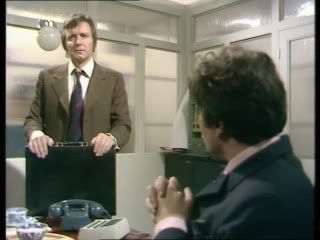 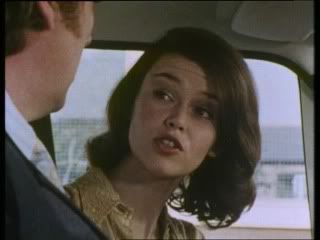
A new narrative based on the character of Lampton, Man at the Top treads some of the same ground covered in Life at the Top, essentially positioning itself as a sequel to Room at the Top. Five of the episodes were written by Braine himself. In this series, Lampton (played by Kenneth Haigh) is married to Susan (Zena Walker) and working as a management consultant in London. ('What the 'ell's a management consultant, anyway?' Braine queries in his narration in the opening episode, 'Charity Begins at Home'. 'Some berk who tells the boss what everybody on the shop floor could have told him for nowt'.) Braine’s novels are transposed to 1970s Britain, an era in which Lampton’s desire for social mobility and materialism was commonplace, as per the lifestyles of Bob (Rodney Bewes) and Thelma (Brigit Forsythe) in Whatever Happened to the Likely Lads? (BBC 1973-4). By updating the narrative to the 1970s, Man at the Top situates Lampton in an era in which his attitudes no longer mark him as the ‘odd one out’ but simply one of the crowd: a man born into the working class who has acquired a middle class position and seeks to surround himself with material signifiers of his status. Lampton fits neatly into this era, whilst also struggling to remain honest to his working class roots. This internal conflict within Lampton is the stuff of which so many 1970s television dramas and situation comedies were made, perhaps responding to anxieties over identity that were shared by the television viewing public, many of whom (like Bob and Thelma in the aforementioned Whatever Happened to the Likely Lads?) may have been working class men and women who had ‘done good’ for themselves and were experiencing a sense of cultural dislocation in their new middle class world of modern semi-detached housing and colour television sets. Produced during an era in which women’s lib was increasingly becoming an issue, Man at the Top also updated Braine’s female characters, offering more of an insight into the lives of the women with whom Lampton is involved. In the first episode, 'Charity Begins at Home', Lampton begins an affair with Jonni Devon (Ann Lynn), the wife of George Devon (Donald Houston), the owner of the charity that has hired Lampton to look over their management. An independent and strong-minded woman, Jonni takes Lampton riding; Lampton seems unsure of this, and tells his mistress that 'In all the cowboy pictures I ever saw, the fella always looks after the girl'. 'Times have changed', Jonni reminds him. 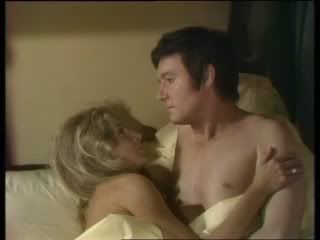 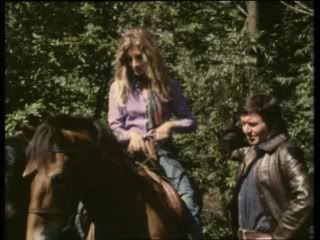
In a historical context where attitudes towards gender where changing radically, Lampton's chauvinism seems anachronistic. At one point in 'Charity Begins at Home', Lampton's employee Jerry Bodine (Peter Beton) confesses that he doesn't drink much because his 'fiance doesn't approve', Lampton responds by disbelievingly declaring 'You what? You should be the one to approve or not approve'. At times, the series' writers seem to share Lampton's attitudes towards women. In 'Too Good For This World', Lampton finds himself in the position of investigating Binsey (Michael Bates), a kind-hearted friend and neighbour who, it seems, has been embezzling money from the firm that he works for. By the conclusion of the episode, Lampton discovers that Binsey has been forced into accepting backhanders from rival firms due to his wife's greed and desire for material things. Binsey has an argument with his wife, Maureen (Caroline Blakiston). 'I've spoilt you all our married life', Binsey tells Maureen. 'Spoilt me? That's a laugh', she ungratefully retorts: 'When a real man's wife wants something, he gives it to her; and if he hasn't got the money, he goes and gets some more'. It's clear that Maureen's materialistic demands forced Binsey into his dishonesty, and during the same argument Maureen reveals that she has been conducting an affair with Binsey's associate Ray Torver (Basil Henson). Maureen is a manipulative woman who, behind the scenes, dominates and emasculates her husband, almost like the femme fatale archetype to be found in classic films noirs. When Lampton discovers Maureen's manipulation of Binsey, Joe confronts his friend. Binsey tells Lampton that 'When we'd been married a couple of years, I really got mad. We'd had a row about some damned awful painting she'd bought for fifty guineas. The woman next door had one, and she wanted one too. I could have understood it if she liked the painting, but she didn't care about art. She didn't care about anything except money and tarting herself up'. In the suggestion that Maureen's demand for material good that she does not need or understand, the episode offers an interesting critique of 1970s-era materialism and the need to 'keep up with the Joneses' – the emphasis on 'status symbols'. 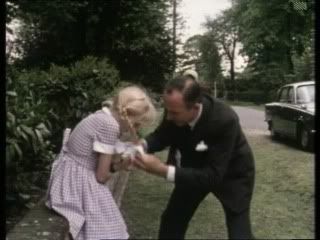 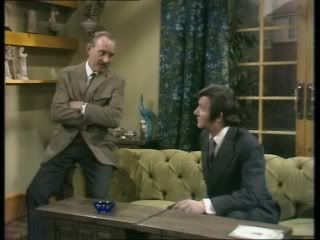
Interestingly, Lampton himself subscribes to the use of material items as status symbols: in 'Charity Begins at Home', Lampton's partner Teddy Soames (James Donnelly) questions Lampton's acquisition of a six thousand pound car. Soames believes that Lampton is too carefree with the company's money; Lampton retorts that 'That car's big shiny proof that we're doing well and can have bigger fees. And to him who hath shall it be given'. 'To him who hath shall it be given' seems to be the attitude of many of the characters that Lampton meets in these episodes, including the slimy and manipulative Toby Marlcliffe (Gawn Grainger) (who Lampton describes as 'a Grade A bastard if ever I saw one) and Ian Somerset (Kevin Colson), both of whom effectively become Lampton's nemeses – much as Edward Woodward's Callan had Toby Meres (Anthony Valentine) and Cross (Patrick Mower). (Lampton first meets Marlcliffe in 'Too Good For This World', in which Marlcliffe offers Lampton evidence that frames the good-hearted Binsey; and Somerset is introduced in 'Join the Human Race', when he makes moves on Susan.) The characters who do not live by this creed, such as the selfless Binsey (who goes out of his way to help Lampton's daughter Barbara) are eaten up and chewed out by those that do 'He was kind', Susan tells Lampton following Binsey's rescuing of Barbara. 'Oh, aye. A perfect bloody neighbour, treats everybody the same [….] Too damn good for this world', Lampton observes. (Maureen leaves Binsey, resulting in Binsey's seemingly inevitable suicide.) Lampton himself walks a tightrope, apparently aware of his characteristics but unwilling to change them. 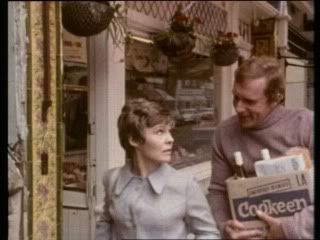 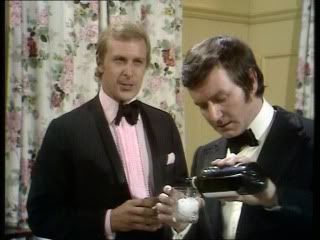
Attitudes to social class are also explored throughout the series. In 'The Prime of Life', Susan becomes worried about the Lamptons' son Harry (Keith Skinner), a student at a local private school. Eventually, Lampton discovers that the 15 year old Harry has a slightly older girlfriend, the 18 year old Julia Dungarvon (Katy Manning). However, Susan is unhappy with Julia because her father is a foreman on a building site and the Dungarvons live in a council house. Susan worries that Harry may 'get her into trouble', reasoning to Lampton that 'These council house types are grown up at 12, let alone 18'. Lampton angrily retorts that 'I'm a council house type myself. I wish you wouldn't talk about them as if they were somehow apart from the human race'. However, in Susan's eyes Lampton has 'risen beyond it, like daddy'. Meanwhile, Julia tells Harry that the Lampton family's house looked 'like a castle to her'. 'It's just a house', Harry tells her. 'That's all you know, Harry', Julia responds. In this episode, Harry also encounters class prejudice from his friends. At school, one of his female friends, the very middle class Mandy (Verna Harvey), refers to Julia as 'that common little bit from the coffee bar': 'Girls like her just use boys like you. They drag them down into the blue', Mandy declares. In truth, Julia seems more interested in the trappings of Harry's lifestyle than in Harry himself: she sleeps with Harry's father, who may or may not have begun the affair as a way of ending Harry's relationship with Julia. Meanwhile, Harry loses interest in Julia and begins a relationship with Mandy 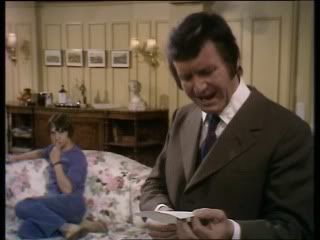 
Lampton is effectively a fish out of water: a member of the Northern working class in the middle class culture of the south of England. By juxtaposing Lampton's attitudes with those of the culture in which he finds himself, at times Lampton becomes an exaggerated stereotype of the brusque Northerner. In the aforementioned 'The Prime of Life', Lampton has a disagreement with his wife about Harry, who Lampton feels is being spoiled by Susan and her parents. In a line that wouldn't sound out of place in a contemporaneous sitcom about social class (such as the BBC's Steptoe & Son, 1962-74), Lampton tells Susan that 'I never had the clothes I fancied at his age. Everything was bought for hard wear, in colours that didn't show the dirt'. Some of the stories – such as the aforementioned 'Too Good For This World', 'The Prime of Life' and 'Join the Human Race' – are genuinely powerful, each featuring a tragic character who ends up being destroyed by the materialistic status-obsessed society in which Lampton moves. Lampton offers criticism of this world, acquiring a sense of objectivity towards it thanks to his status as an outsider. However, despite Haigh's strong performance, the script sometimes paints Lampton as little more than a stereotype of an angry member of the Northern industrial working class; this is probably due to the juxtaposition between Lampton's attitudes and the attitudes of the members of London and Surrey's middle classes with whom Lampton associates. However, on the whole this series is a rewarding experience, thanks to its transposition of Braine's creation into the materialistic world of early-1970s Britain, where Lampton may seem to be something of an anachronism; but he's an anachronism that potently highlights the failings of the society in which he finds himself, even if he is constantly doing little more than 'kicking against the pricks'. A second series followed, and in 1973 a film spinoff was produced for Hammer Films (and directed by Mike Vardy) – once again with Kenneth Haigh in the lead role. Episodes: Disc One: − 'Charity Begins at Home' (50:06) − 'Jt's All Perfectly True' (51:44) − 'Too Good for this World' (52:29) Image Gallery (3:01) Disc Two: − 'The Prime of Life' (50:32) − 'Join the Human Race' (50:21) − 'I'll Do the Dirty Work' (52:11) Disc Three: − 'The Name But Not the Game' (51:44) − 'Change Partners' (49:29) − '… A Bit of Spare, Nothing Else'(51:21) − 'Fixtures and Fittings' (52:00) (Full episode synopses have been compiled and will be uploaded as soon as possible.)
Video
The series was predominantly shot in a studio on videotape, with some filmed location inserts (16mm). The series displays the visual characteristics of most television dramas shot on tape, with flared highlights being common throughout the episodes, especially in the scenes set in Lampton’s office – thanks to the predominance of metal and glass within the mise-en-scene. Nevertheless, the series looks surprisingly good; there is some evidence of tape wear, with a few episodes suffering more than most, including ‘Too Good For This World’. However, it's nothing too distracting. 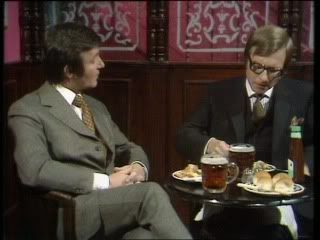 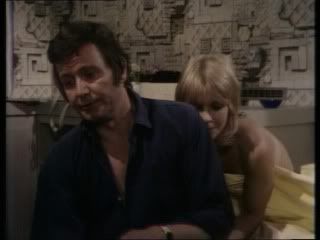
The original break bumpers are intact, and the episodes are presented in their original broadcast screen ratio of 4:3. The episodes appear to be uncut.
Audio
Audio is presented via a two-channel mono track, which is as effective as one might expect. There are no noticeable deficiencies present on the audio track. There are no subtitles.
Extras
Alas, there is no contextual material.
Overall
A fascinating series, largely for the transposition of one of the 1950s ‘angry young men’ to the 1970s, Man at the Top is definitely a worthwhile watch. However, in bringing the character of Joe Lampton into the 1970s the series is arguably not as effective at exploring the tensions within Lampton’s generation as Stan Barstow’s sequels to his 1960 novel A Kind of Loving, which culminated in The Right True End (1972) – bringing A Kind of Loving’s Vic Brown into 1972. (Barstow’s series of novels about Vic Brown was adapted by Granada Television in 1982; this series has also been released by Network. See our review here.) Thanks to its placing of Lampton in both the 1970s and the south of England, sometimes (despite Haigh’s strong performance in the lead role) Lampton seems in these episodes to be so anachronistic as to be, at times, almost comical. (An interesting point of comparison here might be Philip Glenister’s performance as Gene Hunt in the BBC’s Life on Mars, 2005-6; Hunt is arguably to the 2000s as Lampton was to the 1970s – both representing attitudes from an era twenty or thirty years in the past.) At times, the characterisation of Lampton in this series seems to rely too heavily on the stereotype of the brusque Northerner, and some of Lampton’s attitudes seem excessively chauvinistic. Nevertheless, there are some fascinating moral issues confronted here, and some truly tragic narratives. The strongest episodes are, arguably, ‘Too Good For This World’ and ‘The Prime of Life’. This is an excellent presentation of a fascinating series. It’s worth a purchase simply to see the original Jimmy Porter (Kenneth Haigh) in the role of Joe Lampton. Hopefully, Network will release the second series in the future. References: Richards, Jeffrey, 1997: Films and British National Identity: From Dickens to Dad’s Army. Manchester University Press Walker, Alexander, 1974: Hollywood England: The British Film Industry in the Sixties. London: Orion For more information, please see the homepage of Network DVD.
|
|||||

|